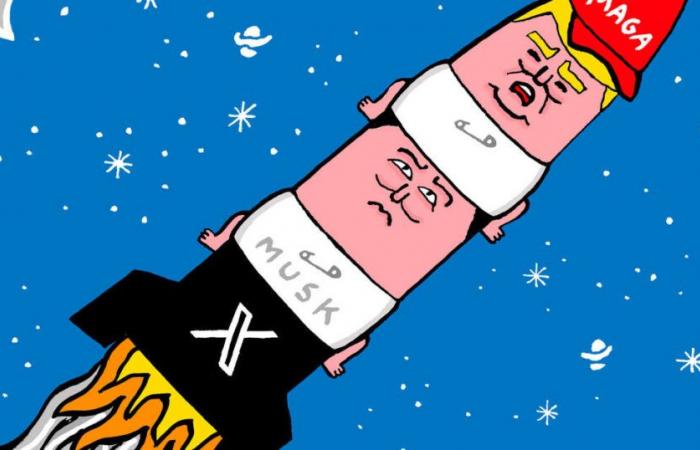Not a day goes by without the American media devoting at least one article to Silicon Valley tycoon Elon Musk, or to one or other of his companies: X, Starlink or Tesla and its brand new robot taxi called Cybercab.
It’s a bit as if the billionaire, who decided to throw all his strength behind the campaign of Republican candidate Donald Trump, was gifted with a real gift of ubiquity.
One thing is certain, it goes far beyond the role traditionally played by extremely wealthy donors during American electoral campaigns. Indeed, he is not content to shower Donald Trump’s campaign with cash, notably via the Super PAC [comité d’organisation politique] that he founded, nor to support the Republican candidate on his X platform.
“Obsessive almost manic”
We now see him jumping on stage alongside the Republican candidate to address the crowds, as was the case last October 5 during a meeting in Butler, Pennsylvania. And distil on its platform mass disinformation about the election and about hurricanes Milton and Helen, which recently swept across Florida and North Carolina.
As summarized The New York Times in a long article published on October 11 and devoted to the unprecedented role played by Elon Musk, who is “obsessed” pathologically and almost “maniac” by the need to see Donald Trump win: “In the final weeks of the presidential campaign, the richest man in the world is getting involved in the American election in a way unparalleled in modern history”.
And the New York daily points out that we could even soon see Elon Musk traveling the roads of Pennsylvania, the main key state in this election, to go door to door to local residents in person. and push them to go to the polls.
The long shadow of apartheid
But behind the hyperactivism and all-out hyperactivity of the billionaire troublemaker, a shadow looms, much darker, recalls the British journalist Simon Kuper in this article from Financial Times translated into French as International mail.
This cast shadow is that of the racist apartheid regime in South Africa. A country in which Elon Musk grew up as well as other Silicon Valley billionaires who also support Donald Trump, like Peter Thiel or David Sacks. A founding experience which explains their ideological positioning today and their vision of America, underlines the British journalist, part of whose family lived in South Africa at the time and who himself spent part of his childhood there.
“In summary, four of the most influential voices in the Maga movement [pour ‘Make America great again’ ou ‘Rendre sa grandeur à l’Amérique’, slogan préféré de Donald Trump] are white men over the age of 50 who had formative experiences in apartheid South Africa. And that’s probably not a coincidence,” notes the journalist, before asserting that a “old white South African mentality persists in Trumpism”.
This might also interest you:
Kamala Harris shatters fundraising records
In less than three months, the Democratic candidate raised $1 billion to finance her campaign. No White House candidate has raised so much money so quickly after entering the race.
“The Apprentice”: an unflattering but “fair” portrait of Donald Trump at the dawn of his rise
Iranian-Danish director Ali Abbasi undertook a particular exercise: tracing the rise of Donald Trump in New York in the 1970s. His biopic “The Apprentice” was released this October 9 in France, two days before its release in the United States, in the middle of the presidential campaign. Find out what the American press is saying about it.
Half-tank, half-car of the future, Tesla’s Cybertruck unleashes passions
Since its launch on the market at the end of 2023, this confusing vehicle has been as divisive as Elon Musk, the sulphurous boss of Tesla. Admired or hated, this 3-ton metal behemoth constitutes a real “culture shock on wheels”analyse The ew York Times in this article translated by International mail.






